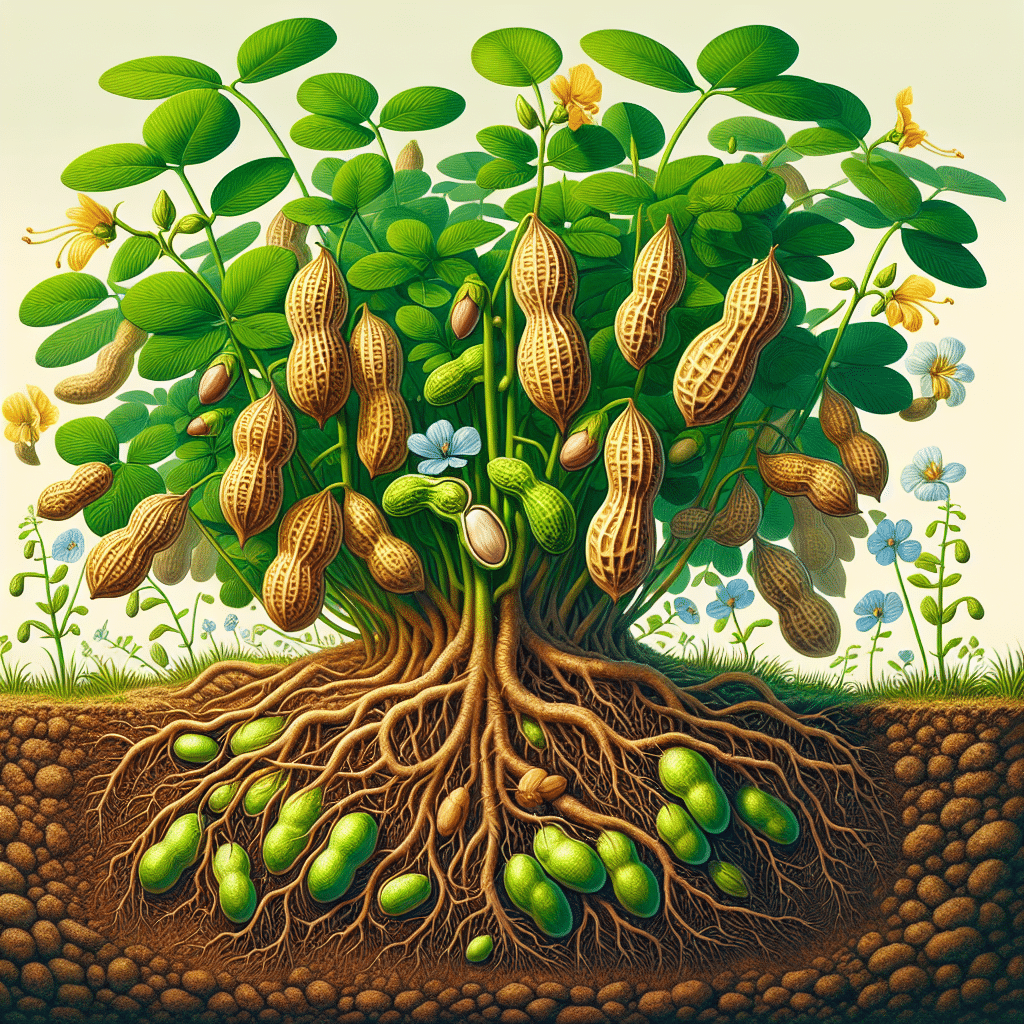Peanut Tree or Bush: Unveiling The Nutty Growth
-
Table of Contents
- Peanut Plant Profile: Understanding Its Growth Habit
- The Botanical Basics: Peanut’s Growth Explained
- Environmental Factors Affecting Peanut Growth
- Peanut Production and Economic Impact
- Health Benefits and Nutritional Value of Peanuts
- Conclusion: The Groundnut Unearthed
- Discover ETprotein’s High-Quality Peanut Protein Products
Peanut Plant Profile: Understanding Its Growth Habit

When it comes to the peanut, there’s often confusion about whether it grows on a tree or a bush. This legume, scientifically known as Arachis hypogaea, has a unique growth habit that sets it apart from other nut-producing plants. In this article, we’ll delve into the botanical world of the peanut plant, exploring its growth, lifecycle, and the factors that influence its development. By understanding the true nature of the peanut plant, we can appreciate the agricultural practices that bring this popular snack from the soil to our tables.
The Botanical Basics: Peanut’s Growth Explained
The peanut plant is neither a typical tree nor a conventional bush. It is, in fact, a legume, which means it belongs to the same family as beans and lentils. The plant’s growth habit is fascinating and unique among nut-producing plants. Let’s break down the lifecycle and growth stages of the peanut plant to understand its development better.
- Germination: The peanut plant begins its life as a seed, which, when planted in warm, fertile soil, germinates and sprouts into a seedling.
- Vegetative Growth: As the seedling matures, it develops into a green, leafy plant that resembles a small bush. This stage is crucial for the establishment of a strong root system and foliage.
- Flowering: The peanut plant produces yellow flowers that, after pollination, initiate an interesting process called ‘pegging.’
- Pegging: Following pollination, the flower’s stalk elongates and grows downward, burying the fertilized ovary into the soil. This is where the peanut actually develops.
- Maturation: The buried ovary matures into a peanut pod, containing typically one to four peanuts. This underground development is what makes peanuts unique among nuts.
- Harvest: Once mature, the entire plant is pulled from the soil, revealing the peanut pods attached to the roots.
Understanding this growth process is essential for farmers and gardeners who wish to cultivate peanuts. The plant’s requirement for warm weather, well-drained soil, and a relatively long growing season are all factors that influence its successful cultivation.
Environmental Factors Affecting Peanut Growth
The environment plays a significant role in the growth and yield of peanut plants. Here are some of the critical environmental factors:
- Climate: Peanuts require a warm climate with a growing season that provides 120 to 150 frost-free days.
- Soil: Light, sandy loam soil with good drainage is ideal for peanut cultivation, as it allows for easy pegging and pod development.
- Water: While peanuts are somewhat drought-tolerant, they need consistent moisture, especially during flowering and pegging stages.
- Sunlight: Full sun is necessary for the peanut plant to produce the energy it needs for growth and nut development.
By managing these environmental factors, farmers can maximize their peanut crop yield and quality. Crop rotation, pest management, and proper harvesting techniques are also crucial for maintaining soil health and preventing disease.
Peanut Production and Economic Impact
Peanut production is a significant agricultural industry worldwide, with the United States, China, India, and several African countries leading in production. The economic impact of peanut cultivation is substantial, providing income for millions of farmers and contributing to the global food supply.
In the United States, peanuts are grown primarily in Georgia, Texas, Alabama, North Carolina, and Virginia. The crop contributes over $4 billion to the country’s economy and supports numerous jobs in the agricultural sector. Peanuts are not only consumed as a snack but also processed into peanut butter, oil, and other products, adding value to the raw commodity.
Health Benefits and Nutritional Value of Peanuts
Peanuts are not only economically important but also offer numerous health benefits. They are rich in protein, healthy fats, vitamins, and minerals. Here are some of the nutritional highlights of peanuts:
- High in monounsaturated and polyunsaturated fats, which are beneficial for heart health.
- A good source of protein, making them an excellent option for vegetarians and vegans.
- Contain antioxidants, vitamins E and B complex, magnesium, phosphorus, and potassium.
- Rich in dietary fiber, which aids in digestion and helps maintain a healthy weight.
The nutritional profile of peanuts makes them a valuable addition to a balanced diet. However, it’s essential to consume them in moderation due to their high-calorie content.
Conclusion: The Groundnut Unearthed
In conclusion, the peanut plant is a unique legume that grows as a bush and produces its nuts underground. Understanding its growth habit, environmental needs, and lifecycle is crucial for successful cultivation. The peanut industry plays a vital role in the global economy, providing nutritious food products and supporting agricultural communities. With their rich nutritional value and versatility, peanuts continue to be a staple in diets around the world.
Discover ETprotein’s High-Quality Peanut Protein Products
If you’re looking for a reliable source of plant-based protein, consider ETprotein’s range of protein products. Their peanut protein is just one of the many high-quality options they offer. ETprotein’s commitment to non-GMO, allergen-free ingredients ensures that you’re getting the best product for your nutritional needs. Whether you’re in the food and beverage industry or looking for supplements to support your health and wellness goals, ETprotein has a solution for you.
About ETprotein:
ETprotein, a reputable protein Chinese factory manufacturer and supplier, is renowned for producing, stocking, exporting, and delivering the highest quality organic bulk vegan protein and plant proteins. They include Organic rice protein, clear rice protein, pea protein, clear pea protein, pumpkin seed protein, sunflower seed protein, mung bean protein, peanut protein etc. Their offerings, characterized by a neutral taste, non-GMO, allergen-free attributes, cater to a diverse range of industries. They serve nutraceutical, pharmaceutical, cosmeceutical, veterinary, as well as food and beverage finished product distributors, traders, and manufacturers across Europe, USA, Canada, Australia, Thailand, Japan, Korea, Brazil, and Chile, among others.
ETprotein specialization includes exporting and delivering tailor-made protein powder and finished nutritional supplements. Their extensive product range covers sectors like Food and Beverage, Sports Nutrition, Weight Management, Dietary Supplements, Health and Wellness Products, and Infant Formula, ensuring comprehensive solutions to meet all your protein needs.
As a trusted company by leading global food and beverage brands and Fortune 500 companies, ETprotein reinforces China’s reputation in the global arena. For more information or to sample their products, please contact them and email sales(at)ETprotein.com today.












